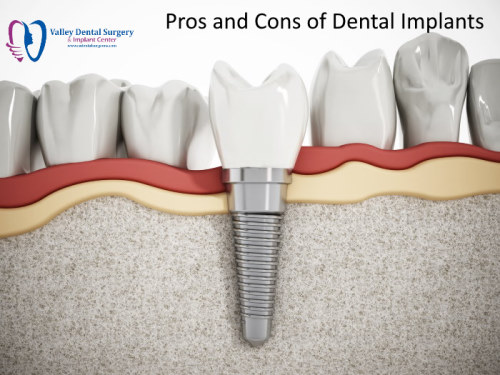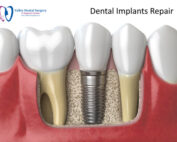Pros and Cons of Dental Implants
Implants are used to replace lost or damaged teeth. They have a high success rate up-to %98 and may last for the rest of life! The key advantage of a dental implant is that it works the same way as a natural tooth. The following are the key advantages of dental implants.
Dental implants work in the same manner as natural teeth.
One of the primary benefits of dental implants is the restored ability to chew normally. Patients can eat, brush, and floss normally, too.
Dental implants prevent bone loss.
The jaw bone degenerates when there are no tooth roots to stimulate it. By replacing the tooth’s root, a dental implant provides the required stimulation for natural bone development.
Dental implants stabilize neighboring teeth.
A missing tooth might result in the crooked shift of neighboring teeth towards the space. This can affect your bite, chewing ability, and look. It can impede future tooth replacement and make it more difficult. Your temporomandibular joint (TMJ) may also be affected by a faulty bite, which may result in pain and headaches.
Dental implants delay the onset of aging and prevent the drooping of the face.
Facial drooping is a harmful side effect of bone loss caused by tooth loss. At this stage, the bottom portion of the face begins to sag, gradually decreasing the distance between the chin and the tip of the nose. Changes such as deeper lines around the mouth, thinner lips, and a sharper chin can make a person appear considerably older than their actual age.
Dental implants last a lifetime.
Studies published in the International Journal of Implant Dentistry indicate that dental implants are designed to last a lifetime. The implant normally consists of titanium and is designed to merge with the jawbone. It is biocompatible, meaning it will not cause harm to the body and will not be rejected by it. Gain a deeper understanding of the Repair of Dental Implants.
Cons of Dental Implants
Dental implants are pricey.
Tooth implantation are not cheap compared to dentures or bridges, but their ongoing costs are less. They range in cost from a few thousand dollars for a single implant to tens of thousands of dollars for a full mouth of implants. The majority of patients only need to undergo implant surgery once, and only need to replace their artificial teeth every few long years.
Dental implants need multiple dental appointments.
Dental implant surgery often involves a series of appointments spaced out over a period of up to 6 months. This may be frustrating if you’re seeking a quick fix for your smile, but the waiting period is necessary so that the jawbone can mend around the implant and securely hold it in place. The good news is that nowadays we can have same day teeth and this way the appointment times can be minimized.
Dental implant surgery could be invasive.
Implant placement needs a series of minor gum and jaw surgeries. Your dentist will explain each step (from the procedure through the healing stage).
Complications may arise with dental implants with negligence.
Although dental implants have an outstanding success rate, complications may arise like all surgical procedures. Your dentist will inform you of potential complications prior to making a final decision to obtain dental implants. Sinus issues, infection, and tissue or nerve damage are a few of the potential risks of dental implant surgery. However, these issues can be remedied through dental implant repair. In the unlikely event that your dental implant fails, your dentist will identify the root cause of the issue and choose the best course of therapy for you.
Dental implants are not suitable for all patients.
Dental implants can replace all of your teeth, but not everyone is a candidate for the operation. You may not qualify for a dental implant surgery if you have poor dental health, have lost a significant percentage of jawbone density, have severe medical issues, and smoke excessively .
While they are designed to last a lifetime, dental implants are a worthwhile investment. Although dental implants require a significant amount of time to place, they can also be loaded immediately with the correct preparation.
Pros and Cons of All on 4 Dental Implants
All-on-4 dental implants, also known as Full Mouth Dental Implants, consist of 4 or more implants deliberately positioned along the arch and attached to a denture plate.
Cons of All on 4 Dental Implants
All-on-4 dental implants have downsides just like any other surgical procedure.
- All-on-4 implants require maintenance like teeth.
- All-on-4 implants require many visits especially in the first year.
- All-on-4 implants may not work with patients with severe jaw bone atrophy.
- All-on-4 implants may not work on patients with uncontrollable blood pressure and blood sugar level.
- All-on-4 implants may not work on patients who are taking certain medications for osteoporosis.
Pros of All on 4 Dental Implants
All-on-4 implant is a dental innovation that provides patients with numerous benefits.
- All-on-4 dental implants work similarly like natural teeth.
- All-on-4 implants improve the quality of life for patients with permanent tooth replacements.
- All-on-4 dental implants surgery can be done in a single dental appointment.
- All-on-4 implants require fewer implants to reconstruct an entire dental arch.
- All-on-4 implants enhance the oral health of patients over time by reducing the incidence of dental diseases, such as periodontitis.
- All-on-4 dental implants negate the need for bone grafting in many cases.
- All-on-4 implants are designed to function with minimal jawbone density.
- All-on-4 implants are significantly less expensive than traditional full-arch restorations.
What else to know besides Pros and Cons of Dental Implants?
Beyond the pros and cons of dental implants, it’s crucial to consider factors like candidacy, the implantation process, post-surgery care, long-term maintenance, the precise placement of implant, and dental implant cost with insurance for informed decision-making.
Since 1999, Dr. Hani Jamah at Valley Dental Surgery & Implant Center has more than 22 dental implant surgeries and can help you regain your smile. Schedule a consultation with us to learn more about the advantages of dental implants and to discuss the All-on-4 option.




